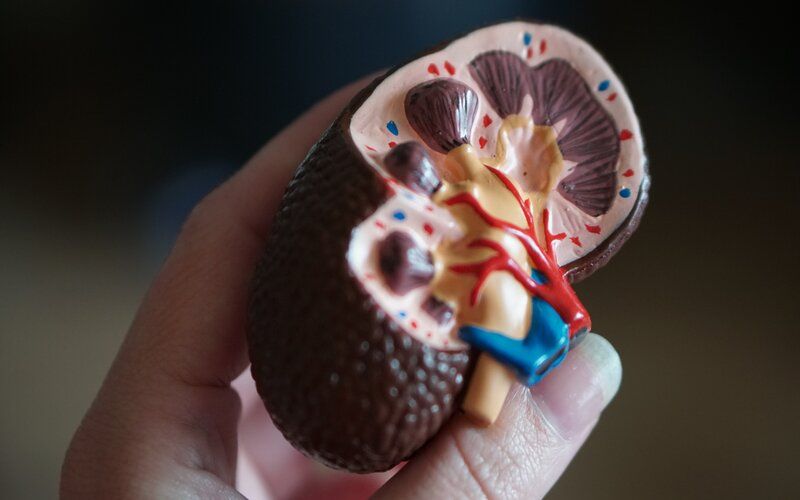Trinity College researchers develop test to accurately diagnose active kidney injury
Posted on: 09 December 2021
/filters:format(webp)/filters:quality(100)/prod01/channel_3/media/image-fix---live-mig/tmp/migration/wp-content/uploads/2021/12/mark-little.jpg)
The test will improve the care of people living with Vasculitis which affects an estimated 1,000 people in Ireland currently, with 100 new cases being diagnosed every year.

Kidney disease is common, affecting about 10% of adults. One of the leading causes of kidney failure is a group of diseases called glomerulonephritis. One of these conditions, called ANCA vasculitis occurs in 100 new people in Ireland each year, with an estimated 1000 people in Ireland living with vasculitis.
Detecting active kidney vasculitis is difficult and a definitive diagnosis requires an invasive procedure called a kidney biopsy. Therefore, non-invasive biomarkers of active kidney inflammation are needed for early detection of active disease. Untreated kidney disease can lead to irreversible scarring and kidney failure, requiring dialysis or transplantation. Unfortunately, up to 50% of people with kidney vasculitis develop kidney failure over time.
Now researchers at Trinity College’s School of Medicine, the ADAPT SFI Centre and Queen’s University Canada’s Kingston Health Sciences Centre have identified a protein (called usCD163 or urine soluble CD163) which is detected in urine when kidney vasculitis is active. The discovery of this new biomarker has the potential to improve the personalisation of patient care, allowing more accurate, earlier diagnoses of kidney injury leading to reduced rates of progressive kidney failure. This will in turn lead to improved patient experiences and overall reduced healthcare costs. The findings are recently published in the Journal of the American Society of Nephrology.
In ANCA vasculitis and other inflammatory kidney diseases, easily accessible, non-invasive tests for active kidney disease (such as usCD163) are urgently needed. Untreated, or undetected kidney inflammation can lead to irreversible kidney failure. Clinical translation of possible diagnostic tests requires rigorous clinical assessment and the use of a clinical grade test.
In collaboration with industry, the team has developed an accurate diagnostic grade urine test, which is starting to be used globally. This diagnostic urine test was assessed in people with active kidney vasculitis, healthy people, and other forms of kidney disease. The team used this information to define an accurate reference range and then prospectively studied patients from throughout Ireland (through Vasculitis Ireland Network) whose physician thought might be experiencing active kidney vasculitis. The team have shown that usCD163 displays high precision in diagnosing active renal inflammation, these findings have the potential to transform the care of patients living with the disease.
The test is accurate, non-invasive, cost effective, requires minimal sample processing and is remarkably stable over time. This means therefore that usCD163 can be measured using existing equipment in clinical hospital laboratories throughout the world, is not affected by a urine sample being left for a period at room temperature, or by transfer to a centre of expertise for measurement. Clinical studies from the team have shown its high level of accuracy in identifying kidney vasculitis disease activity, therefore usCD163 is ready for translation and use in the clinical care of people with suspected kidney vasculitis.
Dr Sarah Moran, Assistant Professor of Nephrology, Department of Medicine, Queen’s University, Canada, and lead author of the study said:
This work was made possible by the Irish nephrology and vasculitis community and supported by the Health Research Board of Ireland. We have shown that usCD163 has the potential to transform the care of patients living with kidney vasculitis by developing a clinical grade assay which is highly accurate in diagnosing kidney vasculitis flares. This is highly significant and will improve the care of people living with vasculitis.
Dr Mark Little, Professor of Nephrology, School of Medicine, Trinity College, and senior author said:
Clinical use of urine sCD163 measurement has already helped us to avoid the need for invasive kidney biopsy in patients with vasculitis. Such translation of a technology, from basic immunology observations in the Trinity Translational Medicine Institute into a clinical test that is now being used across the world, is a rare event. It would not have been possible without broad multi-disciplinary input from TTMI, clinical collaborators around Ireland (particularly Tallaght University Hospital), data science expertise from the ADAPT SFI centre, the Irish vasculitis patient population, the research funders (including HRB, Vasculitis Foundation, Meath Foundation and SFI) and industry collaborators (Euroimmun GMBH).
You can request a PDF copy of the full paper, The Clinical Application of Urine Soluble CD163 in ANCA-Associated Vasculitis, from Ciara O’Shea, COSHEA9@tcd.ie
